2.1NEW BUILDING
As a result of the economic recovery that has taken place in the Community of Madrid during this year, MRG has put into service 4,259 new homes, 15% more than in 2017.
The use of natural gas in new homes is preferred for heating and D.H.W. (domestic hot water); in some developments, we have recovered the use of natural gas for decorative fireplaces and kitchens.
4.259
New homes to which MRG has provided service in the last financial year
2018
MRG has the best new housing developers that offer NGV pre-installation in the reports on the quality of single-family homes
Another noteworthy aspect in the residential market of new buildings is our commitment to the development of NGV pre-installations. Different developers already offer the pre-installation of NGV in the quality reports of their single-family homes without this implying a significant additional investment. This decision will contribute to double the consumption of natural gas in many of the new homes of the Community of Madrid.
On the other hand, and in order to learn first-hand about the needs and expectations of the developers of new housing for the coming years, we have intensified the commercial visits and we have been able to develop an in-depth knowledge of what the new regulation of the sector will bring in terms of to the use of new energy sources. The projects of the new housing developments are already being executed in accordance with the new building criteria with almost zero energy consumption (EECN) and with energy needs less than 50% of the current ones. This will force developers to use renewable energy sources such as aerothermics, geothermal energy and biomass. All this suggests that if we want to avoid the displacement of natural gas by other renewable energies, we must work for the development of biogas or synthetic natural gas.
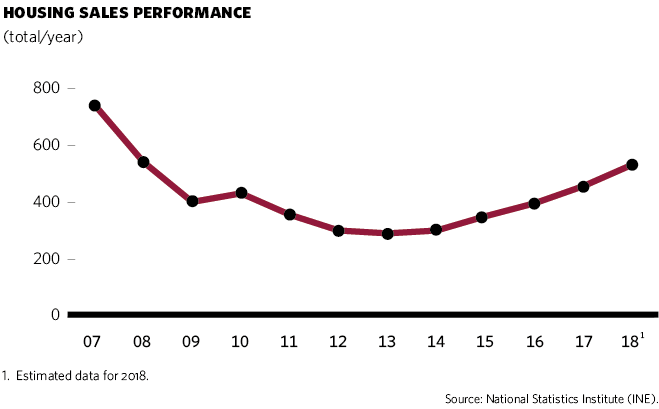
Similarly, the intensification of these commercial visits has allowed us to identify two key points that can slow down our growth in new buildings. The first is the lack of professionals in the construction sector. Of the 150,000 homes that are required annually in Spain (25,000 in Madrid) probably a large majority cannot be built because of the lack of professionals, which is already leading to the rise in prices in new housing (well above the CPI) and, therefore, hindering its acquisition. The second key point is the lengthening of municipal management deadlines for new housing. The average term for the obtaining of construction and first occupation licenses is very high. According to the study of the Co-ordinated Institute of Governance and Applied Economics, the municipalities of Majadahonda, Pozuelo de Alarcón and San Sebastian de los Reyes accumulate delays of 14 months or more in the granting of new construction licenses for residential projects; the average in Madrid is eight months, although the average period for obtaining a first occupation license to register a new gas supply point is three months. Due to these administrative procedures, the average delay in contracting gas for new homes is extended to 17 months, which represents a considerable reduction in revenues for gas companies.
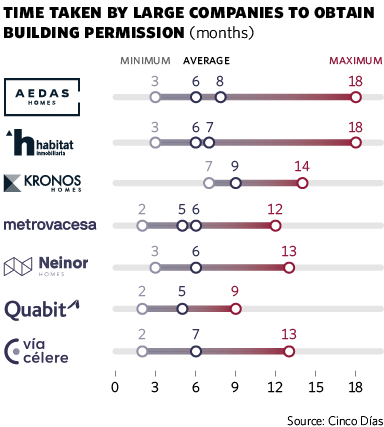
2.2NEW MUNICIPALITIES
One of the priorities of Madrileña Red de Gas is to expand the company’s activity in new municipalities. For this reason, Madrileña is active in the economic and social development of those areas that do not yet have natural gas in order to reach as many users as possible. We are always aware that we must execute our work in a sustainable way that is respectful of the environment and always seeking a balance between economic, environmental and social aspects.
1.100
Miraflores de la Sierra customers will enjoy the benefits of natural gas after the conversion from LPG
45%
The new commissioning of the Miraflores LNG plant may entail up to 45 % annual savings for many homes in the municipality
In 2018, this commitment has been translated into a project that will be carried out in the near future in the municipality of Miraflores de la Sierra. It is about supplying natural gas, through an LNG plant, to the 1,100 residents of the municipality, currently LPG users. They will benefit from the conversion of their facilities to natural gas. The project is now being processed with the city council, pending confirmation of the location of the plant and the respective administrative authorization.
In addition to an improvement in the quality of life of Miraflores homes due to the comfort, safety and cleanliness of natural gas, this project represents a saving in bills of between 20 and 45%, depending on annual consumption and the fuel replaced.
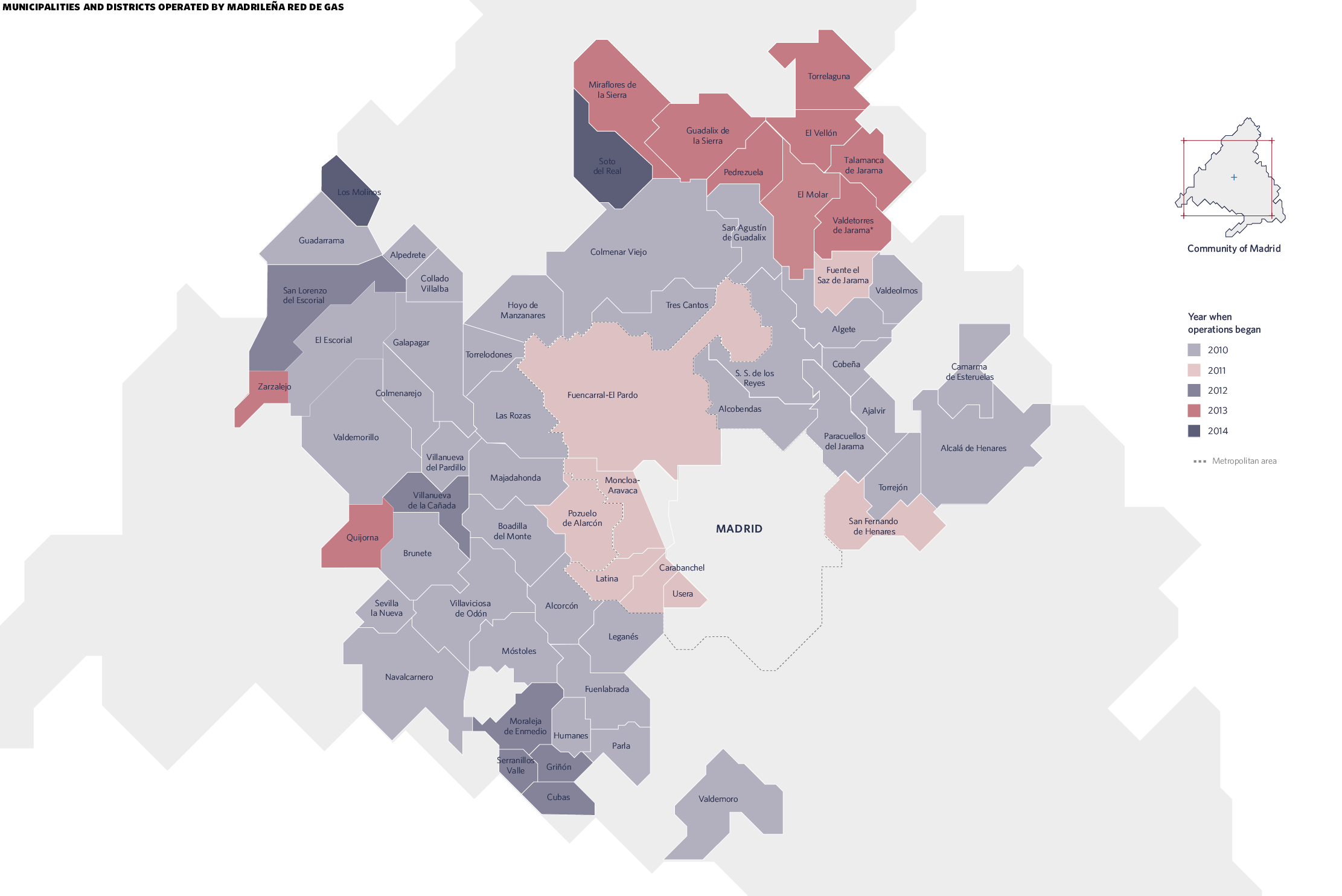
2.3LPG CONVERSION
In 2018, Madrileña Red de Gas has closed 66 LPG plants, which translates into a total of 125 deposits that have been decomissioned and 8,052 domestic supply points that have been converted to natural gas.
The greatest number of conversions has been carried out in the municipalities of Torrejón de Ardoz, with 1,902 points, Móstoles, with 1,604, and San Lorenzo del Escorial, with 1,100 converted points. The closure of these plants and deposits (and the removal of the need to access their supply tanks) has contributed to the urban transport of dangerous goods decreasing by 95,040 km. In this way, we have contributed to reducing operational risk in urban environments and to avoiding the emission of approximately 71,280 kg of CO2.
Next year, Madrileña Red de Gas will continue gradually with its plan to convert the remaining LPG plants acquired in 2016 to natural gas. We therefore contribute to the fact that increasingly more citizens can enjoy one of the most efficient and respectful energies with the environment.
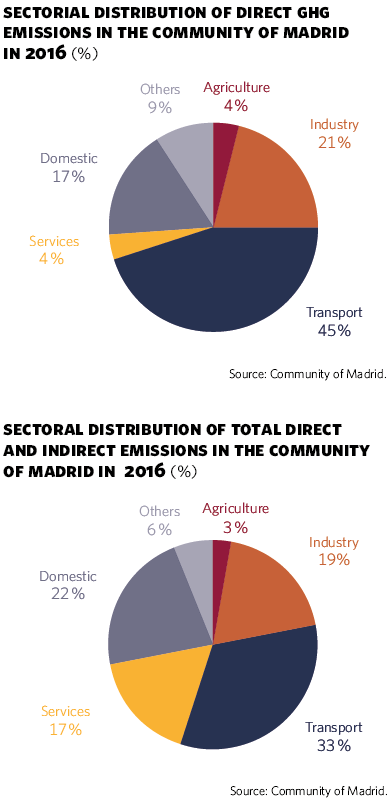
2.4MADRID AND THE BOILER ROOMS
Due to the health problems caused by pollution, the improvement of air quality is a commitment shared by all States and different Administrations.
Optimizing the use of energy to achieve greater energy efficiency is another one of the issues in focus, together with the adoption of mobility-related measures. Road traffic is the factor that most affects the pollution of urban environments and, at the same time, the one that is generating the greatest impact in society today. Perhaps that is why we forget an important sector that, to this day, still uses the same polluting fuels: air conditioning systems. Heating is responsible for 20% of air pollution.
2.898
Tons of CO2 is the amount that has stopped being emitted into the atmosphere after the conversion of 8,052 supply points from LPG to natural gas
20%
Road traffic is the factor that most affects the pollution of the city. It is followed by heating, which causes 20% of the pollution
According to the Ministry of Environment, natural gas is the best alternative for centralized boilers in urban environments. However, in Madrid there is a high percentage of communities that consume fuel that is ineffective and highly polluting, such as coal or diesel fuel, energies that emit pollutants that are harmful to health and to the environment.
Even so, during the last decade, and after the boost that occurred at the end of the nineties, the rhythm of conversion to natural gas of the boiler rooms in Madrid has remained stable although clearly insufficient, according to the levels of contamination reached every winter in the capital. It has been proved that these boiler rooms are what triggers these levels, since vehicle movement in Madrid remains constant throughout the year.
While traffic restrictions measures have begun to be adopted, the same has not occurred in heating ignition. For this reason, Madrileña Red de Gas is committed to more effective measures such as replacing heating devices with those using less polluting energies such as natural gas.
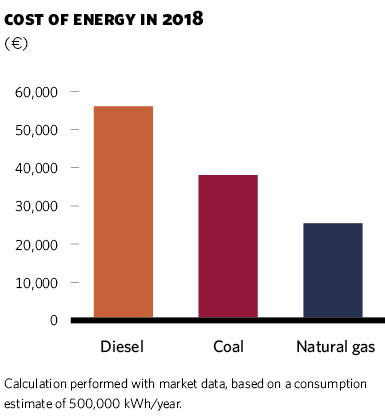
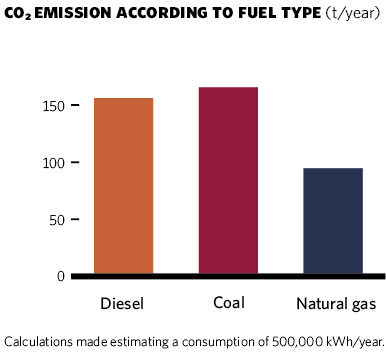
+300
The number of existing coal boilers in the city of Madrid
With the aim of being able to comply with Madrid City Council’s Air Quality Plan, in which the disappearance of coal boilers is anticipated for 2020, Madrid has begun to implement the measures required in order to achieve it. In the city of Madrid there are more than 300 coal boilers. In addition to them being anachronistic, their retention is devoid of any sense; even more so if we take into account that coal mining has all but ceased in Spain. Programmes like the Renove Plan in the Community of Madrid are beneficial. In recent months, the regional government has promoted an incentive that may attain 50% of the investment. However, more awareness and information campaigns are needed to reinforce the economic and environmental benefits of converting these facilities to natural gas. Economic incentives play a crucial role within the homeowners’ associations when considering the replacement of boiler rooms.
43%
The estimated savings of CO2 emissions when a coal boiler is replaced by a natural gas boiler
It is necessary to emphasize new natural gas technologies, such as maximum efficiency condensing boilers, with a performance exceeding 100% and which can reach 109%, and a saving of more than 30% with respect to the use of conventional boilers. Also, the use of natural gas almost completely reduces suspended particles and sulphur dioxide, the main cause of respiratory problems in cities, with a significant reduction in emissions of nitrogen oxides into the atmosphere.
In relation to CO2 emissions, the main cause of greenhouse gases, it is important to note that if we take as a reference the average consumption of boiler rooms already converted to natural gas, the conversion of existing coal boiler rooms would entail a reduction of emissions by 43%. In the case of diesel fuel, it would be 39%. It should be noted that Madrid City Council is working on the renovation of its own air conditioning systems; to date it has already replaced 18 diesel fuel boilers in buildings and municipal facilities, which means eliminating 67% of the current consumption of diesel fuel. In terms of local pollutants SO2, NOx and particles, emission reductions are even greater.
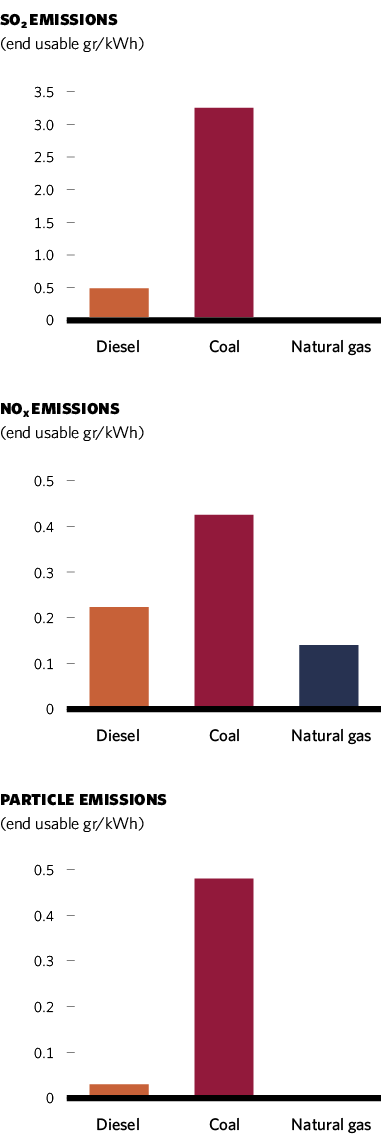
>30%
The economic saving from the use of maximum efficiency condensing boilers. Their performance is also 109 % higher than conventional boilers
1.442
Boiler rooms converted to natural gas by MRG
On the other hand, it is essential to highlight that the conversion of these boiler rooms to natural gas can be addressed without additional costs for users, regardless of whether they can benefit from the Renove Plan contributions. If we compare energy costs, natural gas is about 50% cheaper than diesel fuel and about 30% cheaper than coal. The conversion payment can be made with the savings obtained by the conversion to natural gas within a period of five years. Currently there are proposals for the costs of conversion, energy and maintenance to be borne by residents’associations, while maintaining the quota.
In our scope of action, we have attained a penetration in this market of more than 50%, which translates into the conversion to natural gas of 1,442 boiler rooms, with a total consumption of 750 GWh/year and an average consumption per room of 500,000 kWh/year.
However, in the Community of Madrid there is still a long way to go to improve air quality. In our region there are around 4,000 boiler rooms in communities that use highly polluting energies; 1,120 are located in the distribution area of Madrileña Red de Gas.
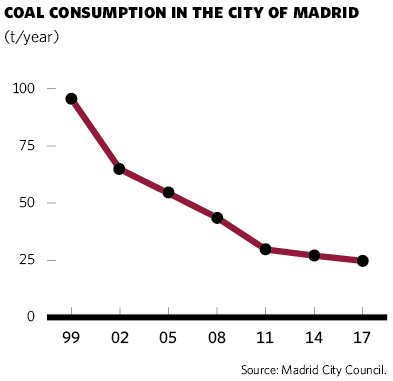
50%
Natural gas is around 50 % cheaper than diesel fuel and about 30% cheaper than coal
| Community of Madrid | MRG Territory | Source: MRG. |
| Diesel | 3,528 | 978 |
| Coal | 310 | 74 |
| Biomass | 218 | 68 |
| Totals | 4,056 | 1,120 |
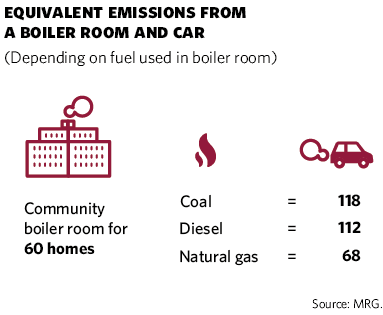
2.5CUSTOMER
This year, Madrileña Red de Gas has defined its digital transformation plan aimed at the customer. As part of its preparation, we have consulted the opinion of users, who have sent us their comments and suggestions for improvements through working groups, on-line surveys and analysis of the contacts and operations carried out in 2018. This has helped us design a new form of more agile communication that simplifies the message and anticipates possible doubts from customers. The plan will be implemented in 2019.
750,000
Customer installations inspected by Madrileña Red de Gas in 2018
Focused on the process of periodic inspection and taking as reference e-commerce companies, in Madrileña Red de Gas we have redesigned all the possible scenarios of communication with the customer in order to generate greater commitment, complementing the traditional channels of communication with mobile and e-mail channels for reminders, and providing access to additional information and self-service links.
Our «virtual office» has been completely modified towards what are known as customer experiences. This has meant that the number of clicks has been reduced and it has also facilitated contextualized information based on what the user requires at all times.
Similarly, pilot self-service tests have been carried out in order to co-ordinate visits through web tools that have been well received by our customers. In relation to customer transactions, in 2018 we have handled more stoppages, cuts and reconnection than during the previous year, which has significantly reduced the volume of other jobs. This reduction has been motivated mainly by the complexity and sophistication required to inspect installations pending the fraud eradication project. At the end of this year, we have inspected 750,566 installations, the equivalent of 85% of our customers. After the completion of this project, we have incorporated the inspection of a significant annual volume of visits into our ordinary activities.
In order to maximize the gas disconnections when the meter is not accessible, this year we have designed a new protocol to disconnect the individual installation from the communal installation . This allows the service to be terminated without having to dismantle the gas installation meter.
Also in 2018, the consolidation of an important update of sector messaging formats has been carried out. This required all distributors and marketers to adapt to this circumstance. At the same time, we have implemented the new administrative disconnection process with a different management of unexecuted stoppages. Note the continuous improvement of results taken by readings. In 2018, we reduced the number of customers without a real reading by 12.8% compared to the previous year.
| 2017 | 2018 | Var.(%) | Source: MRG. |
| Stoppages and Cuts | 19,392 | 20,851 | 8% |
| Re-openings | 4,378 | 5,229 | 19% |
| Others | 352,171 | 147,966 | 58% |
2.6MARKET AND COLLABORATORS
The consolidation of MRG commercial plans and the extension of the agreement with the Madrid Energy Sector Installers Association (AGREMIA) to strengthen the commercial operations from the public offering have encouraged the involvement of AGREMIA-affiliated installers in the marketing of new natural gas supply points.
In 2018, the number of installers acting within the MRG geographical scope has increased by 17%, and 25% of those installers work directly with our company.
Also, the implementation during this financial year of the commercial call centre and the increase amongst our collaborators in the use of the mobile device application, with improvements added to facilitate the display of the potential within the market for vertical and horizontal saturation in our scope of action, have entailed a gross growth of customers of 14% with respect to the previous year.
25%
The increase of companies working with MRG compared to the previous financial year
The involvement in the MRG projects of our extended enterprise has been and continues to be one of the objectives that we must consolidate, since it will allow us to build a firm and genuine relationship with our customers. This will allow us to offer value proposition based on an individualized knowledge of their requirements and problems, so that they can be resolved more quickly and effectively.
Therefore, this year has seen start of the programme of association with gas installer customer service offices, with a forecast growth of 50% by 2019. This new initiative will make it easier for us to create a community of strategic professionals that enhance and value the company’s practices in its closest local environment.
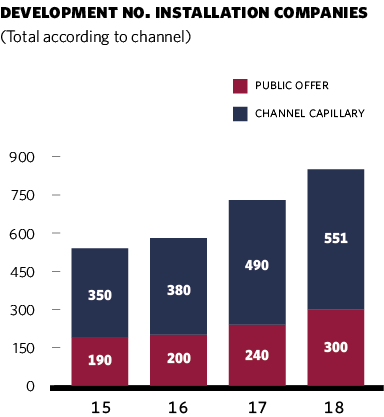
2.7QUALITY
Currently, quality management systems are a benchmark for business excellence. They allow us to reduce improvisation within processes, so that we always know how to act in normal operational situations or in deviations from the established requirements. With this, we contribute to establish mechanisms for monitoring and improving the management of our organization that enable us to offer a quality service that meets the expectations of our customers.
Madrileña Red de Gas continues to develop its transition project for the quality management system in order to adapt this to the requirements of the new revision of the ISO 9001:2015 standard. Once the first phases of design and planning were completed, the work carried out focused on the revision of the system’s regulatory documents and their subsequent publication. The phase of implementation for some of them has already begun.
We have a new internal standard for supplier certification of relevant service providers. It is focused on those suppliers whose activities require accreditations stipulated by law and which must be subject to prior checking and monitoring over time. This standard is complemented by a specific catalogue of files for each activity that describes in greater detail the requirements applicable to the activities usually contracted by MRG. In this way, the precise description of the application criteria is useful and practical, given the magnitude and complexity of legal regulations.
We have also developed a process map from the perspective of quality. It has been structured in two levels: on the first level, the complete photo of the processes is shown and described in detail; in the second, each of the numbered processes. This map provides a complete overview of our main activities and allows us to interrelate processes.
On the other hand, during this exercise we have carried out a first context analysis using the SWOT methodology, an analysis of risks and opportunities from the perspective of quality and a first study of the interested parties, in which, in addition to their identification, needs and expectations have been pointed out, indicating the response mechanisms of the management system.
Similarly, we have begun to update the criteria for the approval of supplier personnel, with special attention to workers who perform their work in electrical installations and in those related to steel welding.
During this year, we have also developed a new environment of collaboration and document exchange in which it is possible to monitor the status of those documents that are in different stages of review, continuing with the adaptation and revision of the internal regulations associated with various operations processes for customers, expansion, network operations and corporate areas.
Finally, between June and July 2018, we conducted a new round of satisfaction surveys on eight segments of services provided by MRG.
The trends of the results obtained after the analysis of these surveys has resulted in:
- A global satisfaction index of 77.9%, which is the global measure of MRG’s success to satisfy its customers.
- 45.6% of MRG users surveyed would recommend us to family and friends. Thus, the global average of recommendation is 7.45 out of 10.
- The level of loyalty or loyalty among the users surveyed reaches 19.6%. It is also called NPS (Net Promoter Score).
Regarding the surveys conducted in previous years, MRG has experienced an improvement in the satisfaction index results in the processes of periodic inspection, home operations, vertical saturation, new building and readings.
Similarly, there have been improvements in the recommendation levels of the new building processes, periodic inspection, vertical saturation, home operations and readings.
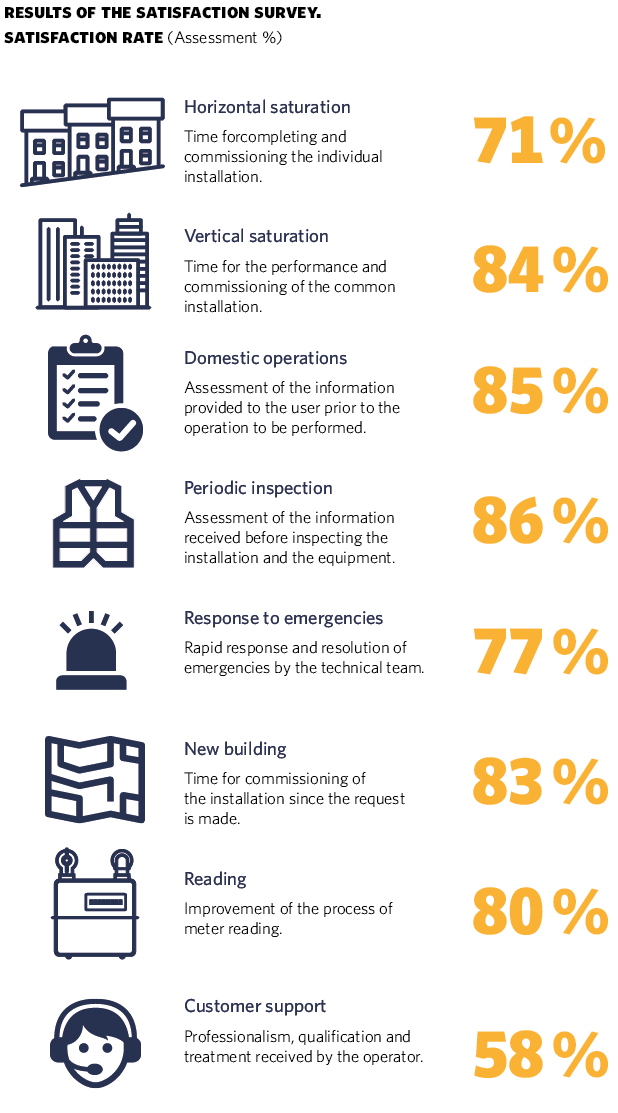
2.8DIGITALIZATION
With the incorporation of companies in the digital world, it is necessary to implement solutions that facilitate the automation of IT processes which, in the very near future, will be extended to business processes. This allows greater control and greater visibility of the status of works during their execution. This minimizes errors and boosts productivity, which places the company in a position of advantage over competitors both in terms of operability and reliability.
In this environment, Madrileña Red de Gas has taken the initiative in the area of automation of processes through robots (RPA), which we intend to extend over 2019. In 2018, an ambitious project of robotization of business processes has been launched in order to maximize benefits by reducing tasks without added value, saving costs and improving the quality and the degree of satisfaction of our customers.
This year, the first eight processes (all of them put into production) of a total of 37 already analysed and capable of being automated, have been robotized within the functional areas of periodic inspection and channel, readings, home operations and fraud, billing/revenue and expansion.
Once the production has been completed and the different robots stabilized, a reduction of 1.25 (full-time employees) has been achieved, which is currently dedicated to tasks of greater added value in the different business areas.
3,500
Smart meters installed in 2018
An important part of this digital transformation has been the migration of 100% of our infrastructure to cloud services from Amazon and Microsoft. This was done in three months, coinciding with a change of provider. This new infrastructure will allow us to be more proactive in management during periods of variability in needs, and to reduce operating costs, as well as to enjoy up-to-date and leading services.
In the second semester of 2018, we have migrated all our technological infrastructure to Amazon Web Services (AWS) in order to reduce operating costs, increase productivity and achieve greater agility in the digital transformation in which we are involved.
On the other hand, we have installed more than 3,500 smart meters in the field. We have therefore eliminated the manual reading of those meters and have ensured accurate daily data that gives greater visibility to the gas system manager and customers.
Similarly, mobility has already been launched for the integral management of common reception facilities, the conversion of LPG to natural gas and the verification process for industrial meters.
2.9CYBERSECURITY
According to the National Cybersecurity Institute (INCIBE), in 2017 there were 123,000 security incidents related to computer attacks, 17% more than in 2016. After becoming aware of this data, throughout 2018 companies have doubled their investment in cybersecurity.
84%
84% of Madrileña Red de Gas staff have received specific training in cybersecurity during 2018
No company or sector is safe from cyber-attacks, and traditional methods to detect them have become obsolete. Modern companies must establish high security standards, regardless of how the business is structured or built, so that the digital workplace is as dynamic and flexible as the cyber threats we face.
Computer science is today an area of vital importance. So much so that in May 2018, the General Data Protection Regulation became mandatory. This new European regulation seeks to ensure that companies protect all data related to the private, professional or public life of consumers. Failure to comply with this regulation will entail large fines.
In order to survive the current technological challenges, Madrileña Red de Gas regards it as it essential to ensure the complete life cycle of data in the digital workplace. For this purpose, we have established privacy protocols and implemented security measures that protect the integrity and availability of this data, whether in transit or stored, allowing secure access without hindering business.
Following our plan on cybersecurity, in 2018 new tool installations have been executed on more modern and resilient platforms. This has enabled us to implement a new telemetry platform that replaces and unifies three previous heterogeneous platforms into a single, more secure platform.
To understand the vulnerabilities of the systems deployed in Amazon Web Services and establish protection plans, we have carried out a cybersecurity assessment from the point of view of cloud/IaaS environments (Infrastructure as a Service). This cybersecurity audit of the new environment applies the C2M2methodology, which identifies areas for improvement in the future.
On the other hand, during this financial year, specific training in cybersecurity has been designed and executed for 84% of employees.
2.10DISTRIBUTION NETWORK
Automated systems that enable faults to be detected quickly and manoeuvres to be made in the network, as well as the participation of highly committed personnel, form the backbone of Madrileña Red de Gas when operating, maintaining and monitoring the state of the gas distribution network in the municipalities in which it is present. Its response is a key measure of excellence.
16%
The increase in natural gas transported by our distribution network in 2018
Through our gas dispatching system, gas emissions are checked daily by comparing the data of these measurements with that provided by SLATR, in order to register timely claims with the system in case differences are detected. Similarly, physical balances are carried out on a monthly basis that allow “unaccounted gas” amounts to be detected by comparing the emissions of the system with the actual gas consumption of customers.
In order to ensure that the “unaccounted gas” that accumulates at the end of the year is zero, and enabling more accurate decision-making to reduce losses in our networks and points of consumption, by 2018 we have enabled two new areas to make emission measurements at sub-area level.
The increase in consumption as a result of the decrease in temperature during 2018 with respect to 2017 has increased natural gas emissions by 15.94% over the previous year.
On the other hand, Madrileña Red de Gas continues to operate without any incidence the transport, unloading and supply of LNG, with an increase of 28.9% in distributed KWh. This is: 16,289,669.91 kWh distributed in 2018 (56 tanks) compared to 12,632,676.40 kWh distributed in the year 2017 (43 tanks).
With respect to the actions in the network of Madrileña Red de Gas, 234 LPG plants have been converted, which means an additional 33.25 km of natural gas network. Similarly, the increase in the natural gas network in 2018 was 0.81% over the previous year.
In relation to emergency activity, Madrileña Red de Gas continues the approach of previous years by maintaining the average time of attention to maximum priority notifications at below half an hour. Specifically, during this financial year of 2018, the average time for maximum priority notifications was 26 minutes and 41 minutes for the remaining notifications.
Also, attention has focused this year on the industrial periodic inspection. A census of each installation’s equipment and the management of periodic industrial inspection and large consumption has been carried out. This initiative confers a greater value upon information for its later use in commercial performances and improvements in the monitoring of reductions.
Another noteworthy point of 2018 is the installation of 4,000 telemetry systems for mass market customers, which have allowed us to improve reading control and the mandatory function of daily regulatory deliveries. This last operation has been as undertaken with normality by the control centre, during a night shift and without an increase in human resources.
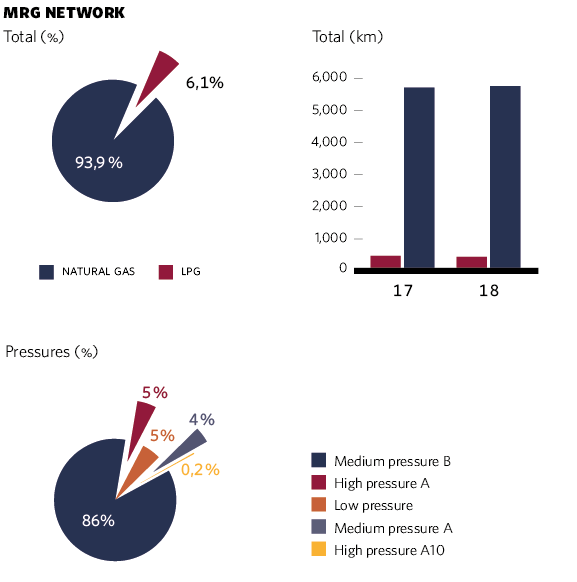
During this financial year, in Madrileña Red de Gas we have run fraud detection campaigns with our own staff, paying special attention to repeat offenders and carrying out tests to measure anomalies in idle meters, etc., which is helping to achieve the objective in the waste reduction project.
We have also carried out 20,856 programmed actions in the entire network, auxiliary facilities and satellite plants for LNG and LPG, which has meant 100% compliance with the maintenance plan established by current regulations and the internal regulation of Madrileña Red de Gas. These have allowed us to check and ensure the correct functioning of our entire network.
Regarding the leak rate/km, in 2018 it has remained at an acceptable 0.21; tracking was performed on 2,483 km of natural gas network with 536 localized leaks.
All activities related to network operation have been executed without incidents affecting the safety of people and goods; we therefore continue without serious accidents.
Regarding the management of LNG and LPG plants, during 2018 we saw intense activity. We have carried out the emptying of 326 tanks, which has involved more than 700 actions and trips to other MRG facilities in order to transfer the gas.
Similarly, 294 tanks have been inertised, 96 have been dismantled and 59 have been periodically and legally restamped.
We have managed 2,713 supplies in LPG facilities, 131 network leak tests and 1,404 regulatory and preventive maintenance actions in active plants; as well as improvements in plants such as those in Soto del Real municipality, where a vaporization system has been installed that has been completed with network meshing between the different LPG plants in the municipality. The supply of gas in that location is therefore guaranteed at all times.
All these activities have been carried out with one hundred percent success, the necessary actions co-ordinated in terms of safety and environmental issues with the different social agents. We have complied with the regulatory environmental requirements, with zero security incidents as well as the supply to our customers.
| External leak | 91 |
| Household leak | 2,633 |
| Leak in CRI | 1,324 |
| Reopening of CRI | 2,164 |
| Breakages by third parties | 85 |
